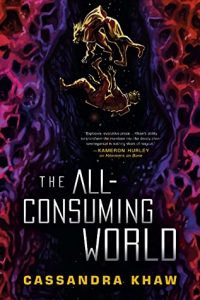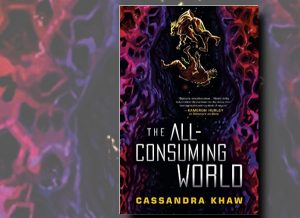THE ALL-CONSUMING WORLD by Cassandra Khaw (BOOK REVIEW)
“But human society wasn’t built on rock and roll. No, it was cobbled from the commodified poor. When in doubt, the species creates itself something to beat up, beat down, bludgeon into grease for the gears of society. All the Minds did was ensure that people like Maya were made.
And people like Maya, well, they were born without fucks to give out.”
Cassandra Khaw has made their name as one of the most exciting voices out there writing short fiction, from their darkly lyrical short stories to the brilliant and disturbing Lovecraftian Persons Non Grata series of novellas. The All-Consuming World (2021) is Khaw’s debut novel, and shows that they are just as powerful and adept at writing longer form. A blistering, foul-mouthed, cyberpunk space opera fuelled by Western and noir tropes, The All-Consuming World breaks down the door with the force of a kick to the head and never lets up until the very end. The novel is told with Khaw’s customary linguistic verve and inventiveness, the imagery popping off the page. The characterisation is perfect, the novel’s grubby and violent space mercenaries so well-drawn that the reader feels like they know them personally. Yet beneath this ridiculously fun apocalyptic joy-ride through the seedy underside of space opera is a thoughtful meditation on trauma, grief, loss and belonging. The novel looks at how society treats those it deems outsiders, and also how this position of the outsider can be reclaimed as a source of power.
 The Dirty Dozen were the scourge of the galaxy, the most feared and ruthless band of heartless mercenaries you prayed you’d never tangle with. Until forty years ago when their last job went south big time. Now over half of them are dead, the rest scattered. But then Rita, their manipulative mastermind, learns that Elise may still be alive and out there in some form, and that she knows of a deadly secret at the heart of the broken remains of the planet Dimmuborgir. It’s time for the Dirty Dozen to get back together for one last job. Unfortunately for Maya, Ayane, Constance and Verdigris, the odds are stacked against them and neither Rita, nor the digital ghost of Elise, nor the superpowerful AI Minds with their own agendas, are telling them the whole truth. If the surviving Dirty Dozen can’t overcome their mutual distrust and lifetimes of trauma to work together, it may spell doom for more than just the Dirty Dozen and their reputations.
The Dirty Dozen were the scourge of the galaxy, the most feared and ruthless band of heartless mercenaries you prayed you’d never tangle with. Until forty years ago when their last job went south big time. Now over half of them are dead, the rest scattered. But then Rita, their manipulative mastermind, learns that Elise may still be alive and out there in some form, and that she knows of a deadly secret at the heart of the broken remains of the planet Dimmuborgir. It’s time for the Dirty Dozen to get back together for one last job. Unfortunately for Maya, Ayane, Constance and Verdigris, the odds are stacked against them and neither Rita, nor the digital ghost of Elise, nor the superpowerful AI Minds with their own agendas, are telling them the whole truth. If the surviving Dirty Dozen can’t overcome their mutual distrust and lifetimes of trauma to work together, it may spell doom for more than just the Dirty Dozen and their reputations.
Khaw’s novel is a love letter to genre fiction. The All-Consuming World gleefully mixes cyberpunk and space opera staples, whilst at the same time clearly drawing much of its influence from the stylised nihilism and violence of noir and the action-packed adventure of the Western. The Dirty Dozen’s ship is even named the Nathanson, after the author of the original war novel The Dirty Dozen (1965) which gives Rita’s badass mercenaries their name. That Khaw manages to combine all these disparate strands, cherry-picking the mode and tropes that work best for their story whilst still managing to make a coherent whole, speaks volumes to their skill as a writer. The novel eschews the stereotypes of these genres as white and male by having a cast entirely of people of colour who are women and nonbinary. Khaw’s lyrical prose is juxtaposed with the filthy, slang and expletive filled slang of the mercenaries, creating a unique and compelling mixture of the beautiful and the profane.
Maya is the bruised, beating heart of the novel. We see the world mostly through her perspective. Like all of the Dirty Dozen, Maya is a clone, a disposable human being designed to fight and brought back from the dead by reloading her consciousness into a new body multiple times. In The All-Consuming World, such people have no rights, are basically expendable labour. The Dirty Dozen have fought back by turning to a life of crime, and being damn good at it. Maya is the muscle, Rita is the brains. Outfitted with all manner of cybernetic enhancements and weaponry, able to modulate her hormones to give her better control over her body, Maya is a ruthless, unstoppable killing machine. She is also entirely bound to Rita, both through her unrequited love for Rita and the cybernetic and chemical controls that Rita has installed in Maya’s brain. Maya is smart enough to know that Rita is abusing and manipulating her but is unable to escape the control, both mechanical and psychological, that Rita exerts over her. This puts her at odds with the rest of the Dirty Dozen, who, following the disastrous job forty years ago, understandably no longer trust Rita. Over the course of the story, Maya learns to break free from Rita’s physical and psychological conditioning, think for herself, and become a better colleague and friend to Ayane, Constance and Verdigris.
What makes The All-Consuming World such a powerful read is the way that Khaw emphasises the “punk” in cyberpunk, something missing from much space opera and ironically from a fair amount of cyberpunk. Khaw’s novel explicitly explores the experiences of the dispossessed, those deemed less than human by society. Throughout the novel, Maya and her friends are told they are vermin and parasites by the society that has created them. The space-faring civilisation of the novel is made possible by the expendable labourers like Maya and the other clones, but the society itself casts them out, refuses to acknowledge their humanity. The All-Consuming World is about fighting back against that. The Dirty Dozen opt for a life of crime because it is the only life available to them where they have any agency. But the life of an expendable mercenary is not that much better than that of an expendable labourer. Maya has exchanged society’s leash for Rita’s. The novel is about her struggle to regain her sense of self, one in which she is able to make decisions for herself and not at the behest of Rita’s whims. Maya and her fellow mercenaries may be contemptuous of the pampered life of society’s elite, but at the same time, their lifestyle does not allow for them to experience anything other than rage. During the course of the story, Maya tries to track down Rochelle, an ex-member of the Dirty Dozen presumed dead, and finds out that she escaped to a small planet, settled down with the love of her life Reyha and had a family. Speaking to Reyha about her happiness with Rochelle in the years they had together, Maya begins to question the life that she has and wonder if perhaps she could have more.
The All-Consuming World immediately joins the ranks of Kameron Hurley’s The Stars Are Legion (2017) and K. C. Alexander’s Necrotech (2016) and Nanoshock (2017) in terms of radical science fiction that is reinventing and revivifying the genre, proving that old genres like cyberpunk and space opera can be vehicles for new and exciting voices. It demonstrates that Khaw is just as compelling and brain-melting across a novel as they are in short fiction, and has left me incredibly excited to see what this writer will do next.

